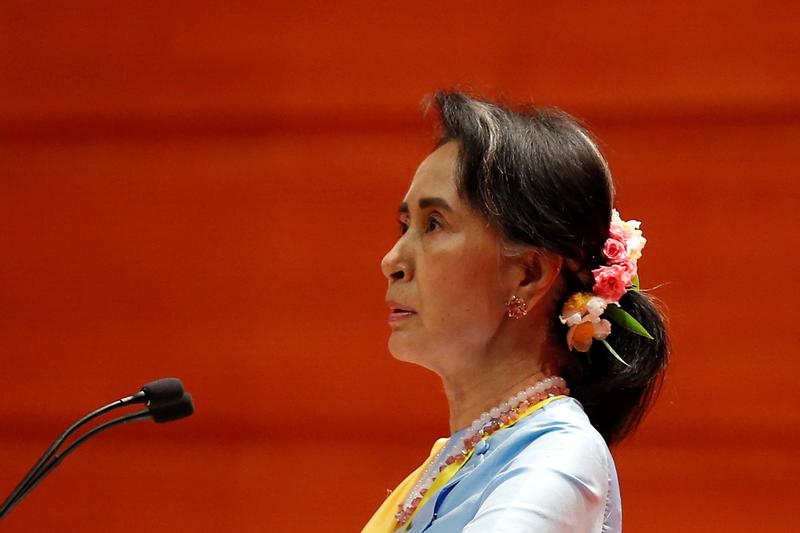Peace in Burma “is starting to take tangible form for the first time,” State Counsellor Aung San Suu Kyi said in upbeat closing remarks at the second iteration of the 21st Century Panglong Conference on Monday in Naypyidaw, where delegates agreed to 37 out of 41 points of discussion over the past six days.
“The world beyond our borders is developing and changing, and it will not wait for us or our future generations,” she added. “It is our children who will reap the fruits of what we are able to sow today. Will we bequeath to them the burden of unresolved internal conflicts? Or will we, through our sacrifice and courage, lay the foundations upon which our children and grandchildren can continue to build and develop a strong and successful country?”
Despite her positive concluding address on Monday, conference participants appeared at loggerheads in recent days over the matter of the word secession — or rather, lack thereof — and whether it should be included as a baseline principle of consensus going forward.
“The discussions were constructive. Saying ‘we will never part’ and ‘we will be together for life’ carry the same meaning. We are negotiating on how to say words of similar meaning in a positive way. The discussions today were leading toward a situation where a mutual agreement might be reached,” said Khun Myint Tun, chair of the Pa-O National Liberation Organisation (PNLO).
The matter was one of the points that negotiators were unable to agree upon at the Panglong peace summit, which convened on Wednesday and brought together some 700 official delegates representing government, the military, political parties and members of Parliament, ethnic armed groups that are signatory to the Nationwide Ceasefire Agreement (NCA) and others.
“We [ethnic Pa-O] have agreed to the principle of non-secession in national-level political dialogues and political dialogues for the ethnic Pa-O. Similarly, other states and regions such Bago [Pegu Division] and Tanintharyi [Tennasserim Division] also agreed to that. … We can accept the rationale behind the word [non-secession], but we need to choose a word that offers everyone satisfaction and dignity,” Khun Myint Tun said.
[related]
The agreed 33 points, reached over the last six days, will form part of an envisaged Union Accord — a document that is conceptually still in its infancy but which the government hopes will one day serve as the foundation for durable peace in a federal Burma.
The 41 points discussed at the 21st Century Panglong Conference covered five issue areas — political, economic, social, security, and land and environment.
A contingent of the most closely watched attendees of this month’s conference, the so-called “Panghsang allies,” departed from the summit early, flying to Kunming in China’s Yunnan province on Saturday. As NCA non-signatories, they had no official say in the policy debates that unfolded over the past several days.
The seven-group coalition, including the powerful United Wa State Army (UWSA) and the Kachin Independence Army (KIA), were invited to Panglong as “special guests.” They met with Suu Kyi behind closed doors on Friday, but did not have a similar sit-down with Senior-General Min Aung Hlaing, the Burma Army commander-in-chief.
A handful of those groups have been engaged in intensifying conflict with the Burma Army, or Tatmadaw, over the past few months and years, a reality that has clouded the Panglong summit and tamped down expectations for a major breakthrough in the peace talks convened on Wednesday.
Before departing for China, N’Ban La, the vice chairman of the KIA’s political wing, told media that he was leaving with success in hand, and that the Kachin group planned on holding a dialogue with the government soon.
May’s 21st Century Panglong Conference, known alternatively as the Union Peace Conference, was originally due to last five days but was extended into a sixth on Monday. The inaugural Panglong summit was held in late August and early September 2016. By way of comparison, that event was a largely ceremonial affair, with little of substance discussed, and the organisers of it planned for a five-day conference that concluded one day early.
Suu Kyi has said she would like to hold high-level peace talks like those that ended on Monday every six months, though the conference that convened Wednesday came nearly three months later than originally hoped for.



